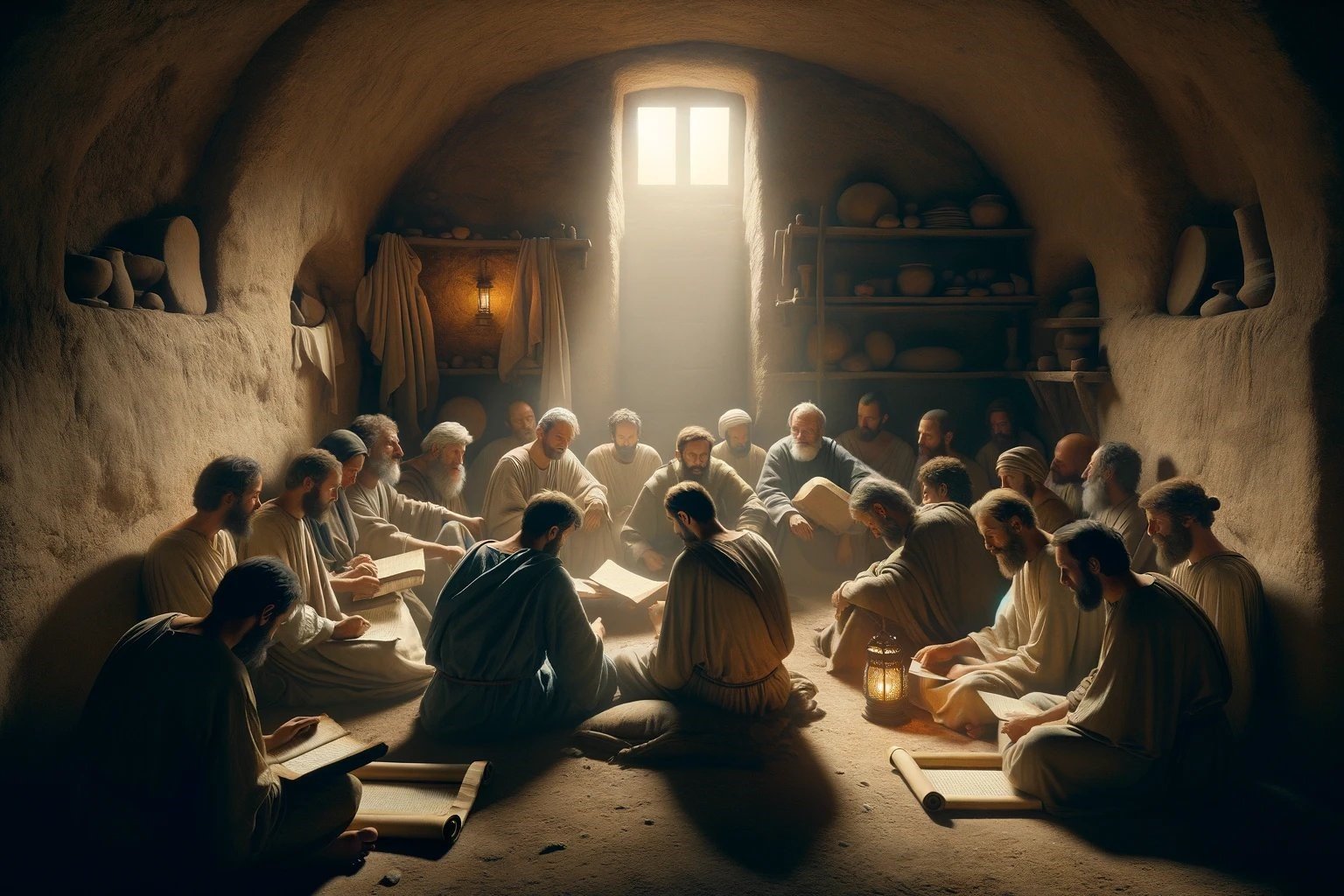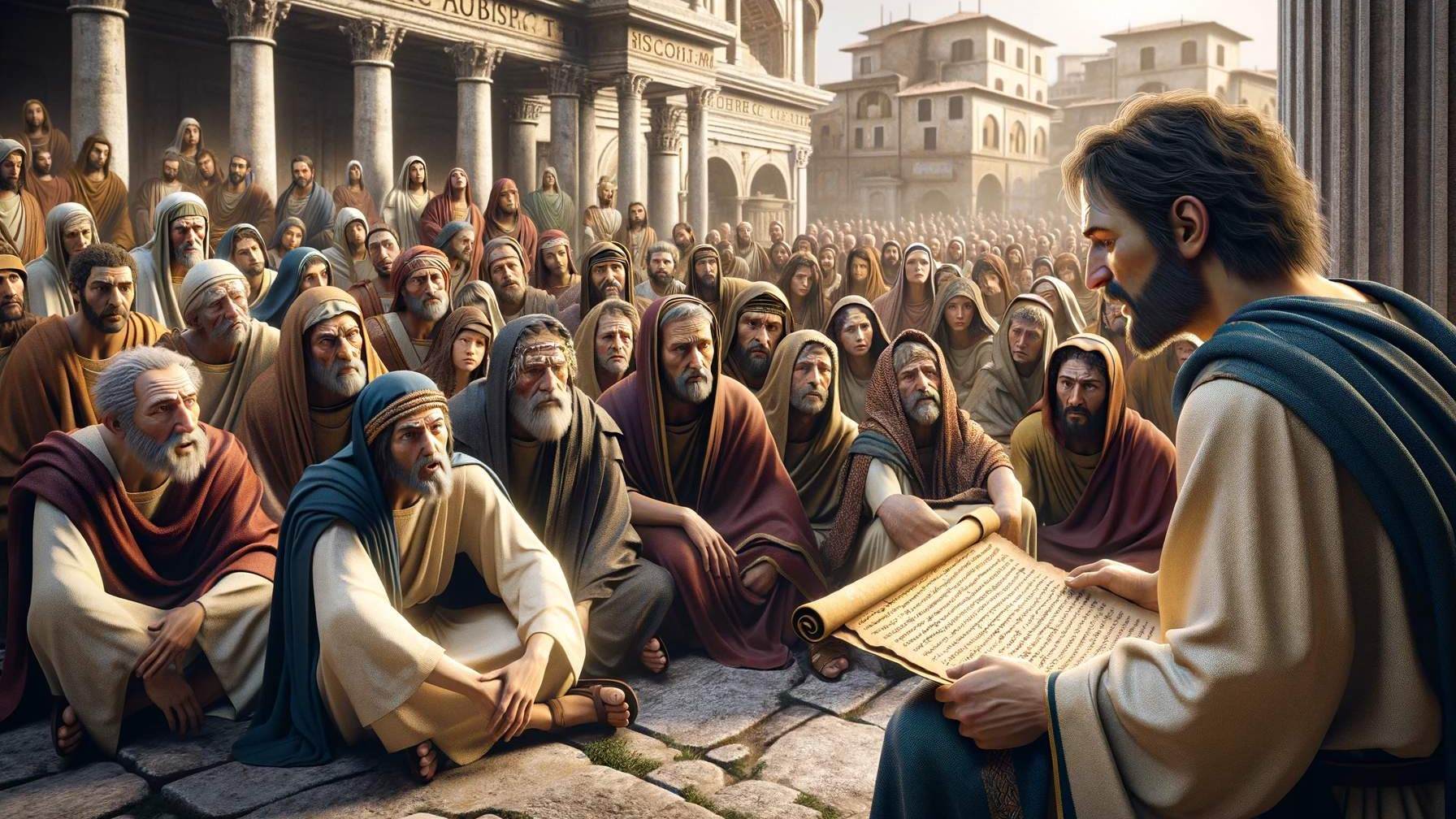Home>Bible Facts>Why Didn’t Martin Luther Believe In The Book Of Revelation


Bible Facts
Why Didn’t Martin Luther Believe In The Book Of Revelation
Published: February 11, 2024
Peter Smith, Editorial Director at Christian.net, combines deep insights into faith, politics, and culture to lead content creation that resonates widely. Awarded for his contributions to religious discourse, he previously headed a major organization for religious communicators, enhancing dialogue on faith's societal impacts.
Discover why Martin Luther didn't believe in the Book of Revelation and explore fascinating Bible facts in this insightful article. Uncover the reasons behind Luther's perspective and gain a deeper understanding of biblical history.
(Many of the links in this article redirect to a specific reviewed product. Your purchase of these products through affiliate links helps to generate commission for Christian.net, at no extra cost. Learn more)
Table of Contents
Introduction
The Book of Revelation, the final book of the New Testament, has captivated and perplexed readers for centuries with its vivid imagery, prophecies, and apocalyptic themes. However, one of the most influential figures in Christian history, Martin Luther, held a unique perspective on this enigmatic text. Luther, a key figure in the Protestant Reformation, approached the Book of Revelation with skepticism, raising thought-provoking questions about its inclusion in the biblical canon.
Luther's views on the Book of Revelation diverged from the widespread acceptance of its divine inspiration and authority. His stance on this book, often referred to as the Apocalypse, sparked significant debate and reflection within the Christian community. To understand the reasons behind Luther's skepticism, it is essential to delve into the historical context of the Book of Revelation and explore the theological considerations that shaped his perspective.
In this article, we will embark on a journey to unravel the intricacies of Martin Luther's views on the Book of Revelation. By examining the historical backdrop, theological underpinnings, and the influence of other theologians on Luther's stance, we aim to gain a comprehensive understanding of why this influential reformer did not fully embrace the Book of Revelation as a foundational scripture. Let us embark on this enlightening exploration to uncover the complexities surrounding Luther's intriguing perspective on the Book of Revelation.
Martin Luther's views on the Book of Revelation
Martin Luther, the renowned theologian and key figure in the Protestant Reformation, held a distinctive perspective on the Book of Revelation. Unlike many of his contemporaries, Luther approached this apocalyptic text with a degree of skepticism, questioning its canonical status and divine inspiration. His views on the Book of Revelation diverged from the prevailing acceptance of its authority, prompting significant contemplation and debate within the Christian community.
Luther's skepticism towards the Book of Revelation stemmed from several key considerations. He expressed doubts about its apostolic authorship, raising questions about whether the text truly emanated from the Apostle John. This skepticism was rooted in Luther's meticulous approach to biblical interpretation, as he sought to discern the authenticity and divine inspiration of each book included in the New Testament.
Furthermore, Luther grappled with the symbolic and allegorical nature of the Book of Revelation. Its vivid imagery, prophetic visions, and complex symbolism presented interpretative challenges that led Luther to question its doctrinal coherence and relevance for Christian faith and practice. He emphasized the need for clarity and doctrinal soundness in biblical texts, and the enigmatic nature of the Book of Revelation raised concerns for Luther regarding its potential to lead to speculative and divisive interpretations.
Additionally, Luther's theological framework and emphasis on the primacy of certain biblical books, particularly the Pauline epistles, influenced his approach to the Book of Revelation. His commitment to justification by faith and the centrality of Christ's redemptive work led him to prioritize certain biblical themes and teachings, which in turn shaped his discernment of the Book of Revelation's significance within the broader canon.
In light of these considerations, Luther's views on the Book of Revelation reflected his rigorous approach to biblical interpretation and theological discernment. His skepticism towards this enigmatic text sparked contemplation and discourse, contributing to the ongoing dialogue surrounding the Book of Revelation's place within the biblical canon.
Luther's nuanced perspective on the Book of Revelation invites us to engage with the complexities of biblical interpretation and the diverse viewpoints that have shaped Christian thought throughout history. By exploring the intricacies of Luther's stance on this pivotal text, we gain valuable insights into the dynamic interplay between theological convictions, historical context, and the pursuit of doctrinal clarity within the Christian tradition.
Historical context of the Book of Revelation
The Book of Revelation, attributed to the Apostle John, holds a significant place in Christian scripture, offering a compelling portrayal of apocalyptic visions and prophetic messages. Composed during a period of intense persecution and upheaval, the historical context surrounding the Book of Revelation profoundly influenced its content and reception within the early Christian community.
The authorship of the Book of Revelation is traditionally ascribed to the Apostle John, who composed this visionary work during his exile on the island of Patmos. This setting of exile and isolation underscores the tumultuous backdrop against which the book emerged. The early Christian community faced severe persecution under the Roman Empire, and John's exile symbolized the broader climate of hostility and oppression experienced by believers at that time.
The Book of Revelation reflects the pervasive sense of urgency and anticipation within the early Christian church, as it grappled with persecution, internal strife, and the eschatological expectations of Christ's imminent return. The vivid imagery and symbolic language employed in the book conveyed profound messages of hope, perseverance, and divine sovereignty amidst the trials and tribulations faced by the early believers.
Furthermore, the historical context of the Book of Revelation is intricately linked to the socio-political landscape of the Roman Empire. The oppressive rule of Emperor Domitian and the cult of imperial worship posed significant challenges to the Christian community, compelling them to navigate the tension between allegiance to the state and unwavering fidelity to their faith in Christ.
The apocalyptic themes and prophetic warnings articulated in the Book of Revelation resonated deeply with the early Christians, offering reassurance of God's ultimate triumph over evil and the promise of a new heaven and earth. The historical context of persecution, political turmoil, and eschatological fervor imbued the Book of Revelation with profound relevance and resonance for the early Christian audience, shaping its enduring impact on Christian theology and eschatological discourse.
By delving into the historical context of the Book of Revelation, we gain a deeper appreciation for the profound challenges and fervent hopes that characterized the early Christian era. The book's visionary imagery and prophetic pronouncements emerged within a crucible of persecution and expectation, leaving an indelible imprint on the collective consciousness of the Christian community and inviting ongoing reflection on its enduring significance.
Theological reasons for Luther's skepticism
Luther's skepticism towards the Book of Revelation was underpinned by several theological considerations that shaped his discernment of its canonical status and doctrinal coherence. One of the primary theological reasons for Luther's skepticism stemmed from the interpretative challenges posed by the symbolic and apocalyptic nature of the book. The vivid imagery, prophetic visions, and intricate symbolism presented in the Book of Revelation raised concerns for Luther regarding its potential to engender speculative and divisive interpretations. As a meticulous biblical exegete, Luther emphasized the need for doctrinal clarity and sound interpretation, and the enigmatic nature of the Book of Revelation prompted him to approach it with caution.
Furthermore, Luther's theological framework and emphasis on the primacy of certain biblical themes and teachings influenced his perspective on the Book of Revelation. His commitment to the doctrine of justification by faith and the centrality of Christ's redemptive work led him to prioritize certain biblical texts, particularly the Pauline epistles, which aligned closely with his theological emphases. In contrast, the eschatological and apocalyptic themes prevalent in the Book of Revelation, while significant in their own right, did not align as closely with the doctrinal emphases that occupied the forefront of Luther's theological convictions.
Moreover, Luther's discernment of the Book of Revelation was shaped by his emphasis on the sufficiency of Christ and the gospel message. His theological orientation towards the sufficiency of Christ's redemptive work and the proclamation of the gospel as the core of Christian faith led him to scrutinize the doctrinal coherence and salvific emphasis of biblical texts. The complex and enigmatic nature of the Book of Revelation, with its emphasis on eschatological events and cosmic upheavals, presented interpretative challenges that led Luther to question its immediate relevance for the proclamation of the gospel and the edification of believers.
In light of these theological reasons, Luther approached the Book of Revelation with a discerning eye, seeking to reconcile its content with the doctrinal emphases that occupied a central place in his theological framework. His skepticism towards the book reflected his commitment to doctrinal clarity, the sufficiency of Christ's redemptive work, and the proclamation of the gospel as foundational tenets of Christian faith. By engaging with the theological reasons underpinning Luther's skepticism, we gain valuable insights into the dynamic interplay between theological convictions and biblical interpretation that have shaped Christian thought throughout history.
Influence of other theologians on Luther's views
The influence of other theologians on Martin Luther's views regarding the Book of Revelation cannot be understated. Luther's theological perspectives were shaped and refined through engagement with the writings and teachings of prominent theologians who preceded him. One such influential figure was Augustine of Hippo, whose theological insights left a profound imprint on Luther's approach to biblical interpretation and doctrinal discernment.
Augustine's nuanced understanding of the allegorical and symbolic dimensions of scripture resonated deeply with Luther, particularly in the context of grappling with the enigmatic imagery and prophetic symbolism found in the Book of Revelation. Augustine's emphasis on the primacy of love and the overarching redemptive narrative woven throughout scripture provided a framework through which Luther approached the complexities of apocalyptic literature. While Augustine's influence on Luther's broader theological framework is well-documented, his impact on Luther's discernment of the Book of Revelation is evident in the nuanced approach that Luther adopted towards this enigmatic text.
Furthermore, the writings of other theologians, such as Origen and Jerome, contributed to the broader theological milieu within which Luther engaged with the complexities of biblical interpretation. Origen's allegorical method of interpretation and Jerome's scholarly contributions to biblical translation and exegesis provided valuable insights that informed Luther's approach to discerning the canonical status and interpretative challenges posed by the Book of Revelation. The diverse perspectives and interpretative approaches advocated by these theologians contributed to the rich tapestry of theological reflection that informed Luther's nuanced engagement with the biblical text.
Additionally, the broader theological debates and discussions within the medieval and early modern periods, including deliberations on eschatology, the nature of prophecy, and the canonical status of biblical books, undoubtedly influenced Luther's views on the Book of Revelation. The dynamic exchange of ideas and the diverse theological currents that characterized the intellectual landscape of Luther's era shaped his discernment of the Book of Revelation, prompting him to critically evaluate its place within the broader biblical canon.
By examining the influence of other theologians on Luther's views, we gain valuable insights into the dynamic interplay of theological traditions, interpretative frameworks, and the enduring impact of historical theological discourse on the perspectives of influential figures such as Martin Luther. The diverse theological currents and the rich tapestry of interpretative approaches that informed Luther's engagement with the Book of Revelation underscore the complex and multifaceted nature of biblical interpretation within the broader Christian tradition.
Read more: Why Is The Book Of Revelation Important?
Conclusion
In conclusion, Martin Luther's nuanced perspective on the Book of Revelation invites us to engage with the complexities of biblical interpretation and the diverse viewpoints that have shaped Christian thought throughout history. His skepticism towards this enigmatic text was rooted in theological considerations, historical context, and the influence of other theologians, reflecting a discerning approach that continues to provoke contemplation and dialogue within the Christian community.
Luther's skepticism towards the Book of Revelation was not a dismissal of its significance, but rather a reflection of his commitment to doctrinal clarity and the primacy of certain biblical themes within his theological framework. His emphasis on the sufficiency of Christ's redemptive work and the proclamation of the gospel as foundational tenets of Christian faith led him to scrutinize the doctrinal coherence and salvific emphasis of biblical texts, including the Book of Revelation.
Furthermore, Luther's engagement with the writings and teachings of influential theologians, such as Augustine of Hippo, Origen, and Jerome, provided valuable insights that informed his approach to discerning the canonical status and interpretative challenges posed by the Book of Revelation. The rich tapestry of theological reflection that characterized Luther's era contributed to his nuanced engagement with the biblical text, underscoring the dynamic interplay of theological traditions and interpretative frameworks that have shaped Christian thought.
The historical context of the Book of Revelation, with its composition during a period of intense persecution and upheaval, imbued the text with profound relevance and resonance for the early Christian audience. The apocalyptic themes and prophetic warnings articulated in the book offered reassurance of God's ultimate triumph over evil and the promise of a new heaven and earth, providing enduring hope amidst adversity.
In light of these considerations, Martin Luther's views on the Book of Revelation prompt us to navigate the complexities of biblical interpretation with humility, discernment, and a deep appreciation for the diverse theological currents that have enriched the Christian tradition. His skepticism serves as a catalyst for ongoing reflection on the enduring significance of the Book of Revelation and the dynamic interplay between historical context, theological convictions, and the pursuit of doctrinal clarity within the Christian faith.
As we contemplate Luther's stance on the Book of Revelation, we are reminded of the vibrant tapestry of theological reflection that has shaped Christian thought throughout history, inviting us to engage with biblical texts with reverence, discernment, and a deep awareness of the diverse perspectives that contribute to the richness of the Christian tradition.














